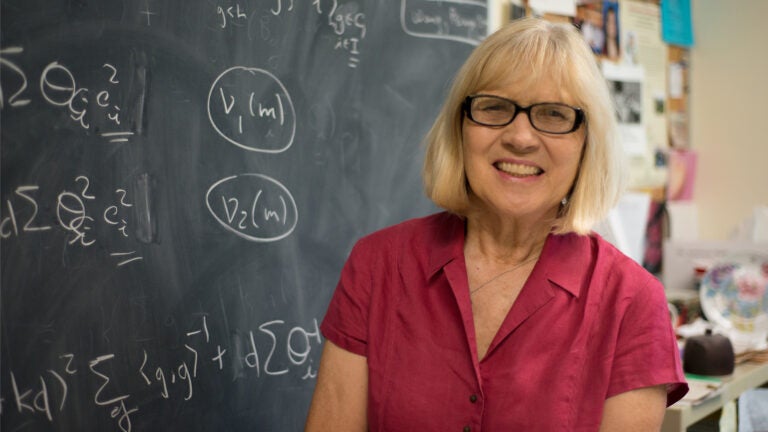
First female tenured USC mathematics professor reflects on academic career
Like many children, Susan Montgomery basked in the wonders of the natural world, collecting rocks and shells, leaves and butterflies, cluttering her room with specimens from the world around her.
Unlike most other children, though, she set exceptionally high ambitions for herself at a very young age.
“For some reason, I wanted to be a doctor when I was 6,” she says, “probably because doctors were the only serious professionals I had met.”
But those ambitions soon faded, replaced by a more numeric pursuit sparked by gifts from her engineer father.
“The fun puzzles my dad brought home from his office were actually math reasoning problems,” she says. “I realized being a doctor was not really fun, unlike math, which maintained my interest.”
Montgomery’s burgeoning passion for mathematics grew further as she entered high school. “I began to love math in ninth grade, when we started algebra,” she says. “The teacher let me go at my own speed.”
Now professor of mathematics at the USC Dornsife College of Letters, Arts and Sciences, Montgomery is one of the longest tenured faculty members in the department.
On a track to tenure and greater representation
Upon graduating from high school in her hometown of Lansing, Michigan, Montgomery enrolled as a math major at the University of Michigan, her father’s alma mater and conveniently just an hour away in Ann Arbor. “And women were not admitted to any Ivy League universities until the ’70s,” she adds.
She earned bachelor’s degree, then went on to earn a master’s degree and a PhD in math at the University of Chicago.
She joined USC Dornsife in 1970, the first female tenure-track professor in the university’s mathematics department.
As a junior faculty member and the only woman in the department, Montgomery formed connections with mathematicians at other universities.
“I went to a lot of meetings and corresponded with people — by old mail!” she says.
At USC, she joined a small group of women science faculty. This would set her on a path to participate in the university’s WiSE (Women in Science and Engineering) program when it formed more than 20 years ago. This past spring, WiSE celebrated Montgomery’s contributions and accomplishments.
Gary Rosen, professor of mathematics and a member of the WiSE Advisory Board, said Montgomery’s efforts to increase gender equality for women pursuing higher education and careers in STEM (science, technology, engineering and math) fields have been instrumental in driving change.
“Professor Montgomery has played a significant role in the WiSE program since its inception, working to increase research opportunities for USC women scientists and engineers at all levels,” Rosen said. “As a member of the Department of Mathematics, she has dedicated considerable time and energy for the benefit of our faculty, staff and students.”
Exemplary mathematics scholar and educator
While Montgomery’s contributions to mathematics research have been extensive, she says the most fulfilling aspect of her occupation has been “interacting with students and seeing them progress through the day.”
“She has served as department chair and, more recently, has done an absolutely superb job overseeing our graduate program,” Rosen said. “In particular, she has worked tirelessly recruiting some of the strongest classes of PhD students that I have had the pleasure to teach and advise since coming to USC nearly 40 years ago.”
Montgomery’s career as a mathematician includes a flurry of accomplishments, including a Guggenheim Fellowship in 1984 and election to the American Academy of Arts and Sciences in 2012. She received the Albert S. Raubenheimer Distinguished Faculty Award from USC Dornsife’s Division of Natural Sciences and Mathematics in 1985 and the Gabilan Distinguished Professorship in Science and Engineering from 2017 to 2020. The American Mathematical Society appointed her an inaugural fellow in 2012.
As a math researcher, Montgomery has worked in noncommutative algebra, in which the rule ab = ba does not hold. She’s also made renowned contributions in the study of Hopf algebras, which have proven important to physics. One of two books she’s written became the most cited book on Hopf algebras and quantum groups.
Former math department chair and Professor of Mathematics Eric Friedlander frequently consults Montgomery’s book on Hopf algebras.
“Although this mathematical topic once seemed somewhat remote, it has played a very important role in many aspects of algebra and mathematical physics,” Friedlander says. “Susan has long been an internationally recognized researcher and proponent of the subject.”
New adventures on the horizon
Montgomery has been an avid traveler during her career, visiting countries on every continent except Antarctica.
As she prepares for what she calls “quasi-retirement” — she’ll spend the next two years on sabbatical before officially retiring — she looks forward to pursuing other interests. Among them: playing piano and attending concerts.
“I go to L.A. Philharmonic concerts as well as various recitals,” she says. It fits with her musical tastes as well as family influence.
“One of my grandmothers was a professional musician, and we all played some instrument,” she says. “Music, for me, is classical.”